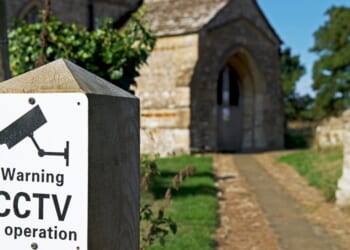
I have a confession: after decades of being a Christian, I still struggle with sin, some of which have dogged me for a long time. In fact, the battle seems more intense in various ways than when I first became a believer.
But here’s the thing: my struggle with sin is one of the ways I know I’m a Christian.
Maybe that sounds wonky to you? Perhaps you’re now chomping at the bit to go off on me in the comments section on the subjects of holiness, sanctification, and right living before God. But before you do, hear me out.
Non-Christians don’t struggle with sin. At least, not like Christians do.
Let’s step back for a moment and start at ground zero on this. The Bible is crystal clear on both our state before and after Christ when it comes to the issue of sin.
Scripture says we all arrive on planet Earth with a built-in law of failure when it comes to being righteous before God. David puts it like this in Psalm 51:5: “Surely I was sinful at birth, sinful from the time my mother conceived me.” He says — contrary to what some secular philosophy and psychology teachers assert — we’re not clean slates and innocent when we enter this world, regarding bad behavior.
For example, I bet you’d agree we aren’t born patient but instead are naturally impatient. And self-centered. And prone to outbursts of anger. And unforgiving. And liars. And greedy.
These bad traits aren’t learned (e.g., young kids don’t learn to lie), but are innate to us, and not only do we not fight against them, but we also use them to serve ourselves and get what we want. As Christian apologist J. Warner Wallace said in response to a question on the subject, “before Christ, I didn’t worry about sin; sin was my life.”
So, in a very real sense, non-Christians have no battle where sin is concerned. There is a desensitization to it and no desire to turn from it, especially if it’s feeding their appetite.
This isn’t to say that people in general won’t try to stop practicing behaviors that can boomerang back on them (e.g., alcoholism, stealing). But the remorse and attempts at change are still inwardly focused and done for their benefit alone.
That’s us before Christ.
After receiving Jesus, the Bible says we are born again (John 3:3), freed from sin as our only taskmaster (Rom. 6:22), and directed to repent and live a righteous life. Paul refers to both states when he writes: “We too all formerly lived in the lusts of our flesh, indulging the desires of the flesh and of the mind, and were by nature children of wrath, even as the rest” (Eph. 2:3).
While we previously swam in the waters of sin without regard to the pool we were in, now we’re awakened to it, realize our predicament, and want to dry off. The problem is, we still have our original nature that wants to dive back into where we were.
That’s because, as Tim Keller says, “Sin is not just an action but a power”.
Contrary to what some fringe groups say, we don’t stop sinning when we receive Christ. Scripture says, “If we say that we have no sin, we are deceiving ourselves and the truth is not in us” (1 John 1:8); “Who can say, ‘I have cleansed my heart, I am pure from my sin’”? (Prov. 20:9); “In Your sight no man living is righteous” (Ps. 143:2); “Indeed, there is not a righteous man on earth who continually does good and who never sins” (Ecc. 7:20); “For we all stumble in many ways” (James 3:2).
There is a dichotomy that exists in the believer, one that the Protestant Reformer Martin Luther described in Latin as Simul Justus et Peccator, meaning “at the same time just and sinner.” Paul wrote about this internal contrast and conflict in Romans 7:
“For what I am doing, I do not understand; for I am not practicing what I would like to do, but I am doing the very thing I hate … So now, no longer am I the one doing it, but sin which dwells in me. For I know that nothing good dwells in me, that is, in my flesh; for the willing is present in me, but the doing of the good is not. For the good that I want, I do not do, but I practice the very evil that I do not want. But if I am doing the very thing I do not want, I am no longer the one doing it, but sin which dwells in me. I find then the principle that evil is present in me, the one who wants to do good. For I joyfully concur with the law of God in the inner man, but I see a different law in the members of my body, waging war against the law of my mind and making me a prisoner of the law of sin which is in my members” (Rom. 7:15–23).
While some teachers have tried to say Paul was describing himself before Christ, the present tense verbs used in vv. 14-25 supports the idea that he is describing his current life as a Christian. He concludes that point by citing his frustration with his current state: “Wretched man that I am! Who will set me free from the body of this death? Thanks be to God through Jesus Christ our Lord! So then, on the one hand I myself with my mind am serving the law of God, but on the other, with my flesh the law of sin” (Rom. 7:24–25).
In his renewed mind (Rom. 12:2), he serves righteousness, but his remaining sin nature continues to serve sin (vs. 25), hence the battle that every Christian experiences.
And one way believers know they’re truly saved.
Now, make no mistake, the habitual, carefree lifestyle of sin should erode as John says: “No one who abides in him keeps on sinning; no one who keeps on sinning has either seen him or known him” (1 John 3:6). Along the way, the believer is more sensitive to sin as they grow in grace, which can seem to intensify the struggle even more.
This, again, is one way a believer knows their salvation is real. The Great Awakening preacher Jonathan Edwards wrote in his work Religious Affections that the false Christian makes a profession, continues to live in sin, and has no holy longings for righteousness, whereas the true Christian makes a profession, still struggles with sin, but has holy longings for the things of God and a desire for the eventual end of sin.
Such freedom isn’t achieved in this life, as Paul said: “Not that I have already obtained this or am already perfect” (Phil. 3:12), despite what Christian “perfectionists” preach. John MacArthur underscores this when he writes: “All perfectionism is essentially a disastrous misunderstanding of how God works in sanctification. Sanctification is a process by which God — working in believers through the Holy Spirit — gradually moves them toward Christlikeness (2 Corinthians 3:18). That the transformation is gradual — not instantaneous, and never complete in this lifetime — is confirmed by many passages of Scripture.”
That being the case, when we read Jesus saying in Matthew 5:48, “Be perfect, therefore, as your heavenly Father is perfect”, we need to balance it with His other statement admitting that we’ll always fall short and need forgiveness as shown in the Lord’s Prayer: “Forgive us our trespasses” (Matt. 6:12).
Non-Christians don’t make such petitions because they don’t feel the need and are “dead in sin” (Eph. 2:1). A man once came to a preacher and said, “Pastor, I don’t feel this ‘weight of sin’ that you talk about.” The pastor responded, “If you put 400 lbs. on a corpse, would it feel it?”
So, if you feel the burden of sin in your life, chances are you’re not dead in sin but instead alive in Christ and sensitive to the unrighteousness that plagues us all. And that’s one way you know you really belong to Him.
Robin Schumacher is an accomplished software executive and Christian apologist who has written many articles, authored and contributed to several Christian books, appeared on nationally syndicated radio programs, and presented at apologetic events. He holds a BS in Business, Master’s in Christian apologetics and a Ph.D. in New Testament. His latest book is, A Confident Faith: Winning people to Christ with the apologetics of the Apostle Paul.

















